Capak: Relaxation of COVID Restrictions Still Being Considered
ZAGREB, 12 March 2022 - Croatian Public Health Institute director Krunoslav Capak said on Saturday that the possible relaxation of coronavirus restrictions, announced for next week, was still being carefully considered given a slight increase in new cases in recent days.
"Since we have had a slight increase in infections, I cannot say if there will be a further relaxation of measures," Capak told reporters in Zagreb during a public health campaign marking Colorectal Cancer Awareness Month.
Even though some media outlets have announced that the restrictions on hospitality establishments will be eased and that nightclubs will be allowed to stay open until 2 am, Capak did not confirm this.
"A possible relaxation is still being considered, and what is certain is that COVID passes will remain mandatory for healthcare and social welfare services," he said.
The slight increase in new cases will be taken into account in deciding on the relaxation of restrictions, and Capak said that Croatia was not an isolated case in this regard as most European countries were in a similar situation.
One of the reasons is the more infectious BA.2 subvariant of the Omicron variant of the SARS-CoV-2 virus, which is becoming dominant in western Europe, people thinking that the epidemic is over, resumption of school classes, and cold weather, as a result of which people spend more time indoors.
Capak noted that the slight increase in new infections did not mean the beginning of a new wave of the epidemic and that it was yet to be seen what would happen in the coming days.
"The increase in new infections is a warning that the epidemic is not over and that we should comply with the epidemiological measures which are still in force," Capak said, adding that the turnout for vaccination was not satisfactory.
"People have given up, they are still postponing vaccination thinking that the epidemic is over. There are enough vaccines and vaccination should continue because it is a very powerful weapon," Capak said, calling on people to observe hygiene rules, wear face masks, maintain a physical distance and air out their rooms.
World Kidney Day: It's Time for National Detection Plan
ZAGREB, 10 March 2022 - World Kidney Day was marked on Thursday at the Croatian Medical Association with the message about the importance of prevention and for a national action plan to be launched in Croatia for the early detection of chronic kidney disease, which is something that one in ten adults contract.
Chronic kidney disease does not have any symptoms, it is not painful and remains undetected, which is why it is important to launch a national early detection programme, the president of the Croatian Association for Nephrology, Dialysis and Transplantation, Mario Laganović, told a press conference.
World Kidney Day, which is marked on the second Thursday in March, was marked in Croatia for the 17th year in a row and this year's slogan is "With knowledge to better care of kidney patients."
Laganović presented the results of an initial screening programme for early detection of chronic kidney disease that was conducted in 40 family doctors' offices throughout Croatia. The screening encompassed 428 at-risk patients with high blood pressure, diabetes, obesity and a family history of kidney disease.
Undetected kidney damage was identified in 23% of the patients, which indicates that its frequency among at-risk groups is much higher than in the general population.
"The results speak in favour of the need for a programme to be launched at the national level for early detection and treatment of chronic kidney diseases such as those which already exist for diabetes, heart disorders and malignant diseases," Laganović said.
His colleague Lada Zibar called on those in power to dedicate attention to kidneys for the sake of the well-being of patients but also for the healthcare system because the cost of haemodialysis for a patient costs between HRK 100,000 and 150,000 a year.
For more, check out our lifestyle section.
Number of Organ Transplants In Croatia In 2021 Up 26.5% Despite Pandemic
ZAGREB, 1 March 2022 - Despite the COVID-19 pandemic, the number of organ transplants in Croatia increased by 26.5% in 2021 compared with 2020, according to data provided by the Health Ministry.
There were 121 donors, and 268 solid organs were transplanted, or 65.4 organs per million people.
A total of 124 kidney, 34 heart, 9 lung and 104 liver transplants were successfully performed. The number of kidney transplants increased by 26%, of liver transplants by 9.5% and of heart transplants by 36%.
The largest number of transplants were performed by Zagreb's Merkur and KBC hospitals - 144 and 88 respectively. Among the clinical hospitals, Zagreb's Sisters of Charity Hospital had the largest number of registered donors (23), while among the general hospitals the one in the northern city of Varaždin led with 17 donors.
Even though the organ transplantation programme was briefly suspended because of the coronavirus pandemic, Croatia remained one of the world's most successful countries in organ donation and transplantation.
A lung transplantation programme was launched in April 2021 and by the end of the year nine lung transplants were successfully performed on Croatian recipients, the ministry said.
HDZ Official Rules Out Scrapping COVID Passes
ZAGREB, 8 Feb 2022 - Croatian Democratic Union (HDZ) vice president Branko Bačić said on Tuesday that the current epidemiological situation did not allow for a possible revocation of COVID passes.
"It's neither under discussion nor consideration," Bačić said in response to reporters' questions if the authorities are considering doing away with COVID certificates.
He recalled that the current epidemiological situation, including a rate of only 67% of fully vaccinated persons and the current incidence rate, were not conducive to plans to ease the restrictions.
Since the introduction of the COVID certificate mandate in the public sector, approximately 120,000 asymptomatic citizens have been diagnosed with coronavirus.
He said that vaccination rates in the countries that are now thinking of scrapping COVID passes are much higher than in Croatia.
There is no country in Europe that has completely done away with COVID certificates, he said.
Protesters Against COVID Protocols Rally Outside HZJZ
ZAGREB, 1 Feb 2022 - Roughly a hundred people on Tuesday gathered in front of the headquarters of the Croatian Institute of Public Health (HZJZ) in Zagreb to protest against COVID-19 protocols and testing in schools, and an estimated 60 people protested in Split.
Similar protests with just a score of protesters were registered in Zadar and Rijeka.
During the rally in Zagreb, protesters carried banners with the messages "Stop Terror against Children!", "No to COVID passes!", "Stop to Uniformity!", and the most vocal protesters criticised politicians, epidemiologists, educational workers and journalists.
The entrance to the HZJZ headquarters was guarded by riot police officers, while the protesters demanded a meeting with the HZJZ leadership to hand in their requests. At the end of the protest, one of the representatives of the rally was let in the building to hand in their demands.
During the rally, Andrija Klarić, who also led anti-vaxxers' protests in recent months, said that COVID certificates should be abolished as they were useless and he was also against the testing of healthy people, insisting that this would only be an irresponsible loss of money.
Marin Miletić of the parliamentary Opposition Bridge party, and MEP Ivan Vilibor Sinčić of the non-parliamentary Human Shield party called via Facebook on opponents to the COVID certificate to hold rallies.
A Religion teacher, Ivan Pokupec, told the Zagreb rally that not enough protesters had gathered, adding that the opponents should continue fighting for their cause in a silent manner until more protesters could turn out at rallies.
In Split, about 60 opponents rallied outside the county headquarters to criticise the plan for weekly testing of school children for coronavirus.
They declined to give statements to the press and some of them only expressed anger at media outlets.
HZJZ: Protests against COVID rules just put pressure on health workers
Ahead of protests against COVID rules, officials from the HZJZ said this morning that the protestors are just feigning care for the health of children and are in fact just putting pressure on health care workers.
"These undeclared organisers are just feigning care for children and their health and in fact are just using them as an instrument to achieve some other objectives they consider to be important," officials from the HZJZ said.
HZJZ said that the protests, which have been announced via social media by the "Free together" group, would just put pressure on healthcare workers and epidemiologists who have been doing their job in the best of faith for the last two years, adding that their recommendations are based on scientific evidence of the need for vaccination against coronavirus, in particular of the elderly.
“Protests, swearing, threats and everything else associated with that will not resolve the problems we have all been faced with during this epidemic," HZJZ officials said.
HZJZ: Protests Against COVID Rules Just Put Pressure on Health Workers
ZAGREB, 1 Feb 2022 - Ahead of protests against COVID rules to be held on Tuesday outside public health institutes around the country, officials from the national institute have said the protestors are just feigning care for the health of children and are in fact just putting pressure on health care workers.
"These undeclared organisers are just feigning care for children and their health and in fact are just using them as an instrument to achieve some other objectives they consider to be important," officials from the Croatian Public Health Institute (HZJZ) said.
HZJZ said that the protests, which have been announced via social media by the "Free together" group, would just put pressure on healthcare workers and epidemiologists who have been doing their job in the best of faith for the last two years, adding that their recommendations are based on scientific evidence of the need for vaccination against coronavirus, in particular of the elderly.
“Protests, swearing, threats and everything else associated with that will not resolve the problems we have all been faced with during this epidemic," the HZJZ officials said.
Minister Says New Rule Aimed at Abolishing Self-Isolation For Schools
ZAGREB, 27 Jan 2022 - Science and Education Minister Radovan Fuchs said on Thursday that the purpose of the ministry's new epidemiological rule was the abolishment of self-isolation for students so as to enable face-to-face classes as much as possible.
This means that children with symptoms of infection with COVID-19 and children who test positive after taking a rapid antigen test stay at home while all the others go to school, the minister told reporters ahead of a government session.
The ministry will send instructions to school principals regarding the testing, Fuchs said, adding that the latest rule would go into force "once we have a sufficient amount of tests to be distributed to schools" (around three million).
I believe in parents, face-to-face classes must be in everyone's interest
Schools will supply parents with tests, and they will test their children on Mondays, before they go to school, and when necessary, if an infection is reported in the classroom.
Asked how one could control if parents really test their children, the minister said there was no way to control it but that he believed in parents.
"This is in children's interest. Everyone should be interested in having children go to school," he said.
"I believe that most parents will act responsibly," he stressed.
According to the ministry's estimates, the implementation of the latest rule could cost around HRK 70 million, and the tests, to be procured through the Buffer Stock system, will cost up to HRK 20 million.
Croatia To Extend COVID Protocols Until February's End
ZAGREB, 27 Jan 2022 - Interior Minister Davor Božinović, who is at the helm of Croatia's COVID-19 crisis management team, said on Thursday that current COVID protocols would remain effective until the end of February if no changes happened in connection with the coronavirus pandemic.
"In the next few days, the crisis management team will consider the protocols on public gatherings, public transport, shopping, protective mask mandate, and cross-border protocols, and they are likely to remain in force until the end of February," Božinović told the government.
Health Minister Vili Beroš said that the PCR tests conducted in the last 24 hours had detected 10,500 new cases, plus 6,375 cases detected by rapid antigen tests, however, the daily caseload is 3.5% smaller than seven days ago.
There are 2,006 hospitalized patients today, 30 more than yesterday, and 185 are on ventilators, seven fewer than yesterday, he said.
Hospital admission numbers are rising mildly but not in proportion to the number of new infections, he said.
For all you need to know about coronavirus specific to Croatia, make sure to bookmark our dedicated section and select your preferred language if it isn't English.
Health Minister Visits Site of Future Institute of Immunology Factory
ZAGREB, 17 Sept 2021 - Health Minister Vili Beroš on Friday visited the site of a future Institute of Immunology factory in Brezje near Sveta Nedelja, west of Zagreb, where the production of snake antivenom would be relaunched, to be followed by the production of plasma-derived products and child and other vaccines.
Institute of Immunology director Vedran Čardžić said that the construction of the factory, a project worth about HRK 100 million, should start at the end of 2022 or early 2023.
The factory's main product would be vaccines but there are plans to launch the production of antivenom for the duration of preparations for construction work and regulation of the related legal matters.
"We will launch the production of antivenom during preparations for the construction of the new factory. That unit will be part of the new factory which will focus on vaccines against children's diseases (measles). Those vaccines used to be produced by the Institute of Immunology and the state owns the master seeds which international experts say are the best because they give the best vaccination results owing to their properties," said Čardžić.
This is expected to be followed by the launch of production of plasma-derived products and potential adoption of technologies for the production of newer virus vaccines in cooperation with partners, which is being negotiated, he said.
Minister Beroš said that this spring Croatia was faced with a shortage of antivenom, and even though the problem was quickly solved, he noted that as a tourist destination, Croatia should be able to rely on its own antivenom production.
He noted that antivenom production was expected to start before the next tourist season, adding that current employees of the Institute of Immunology would make up the core of the research staff at the new factory.
Čardžić also pointed to the need to attract new experts, noting that he would contact universities to inquire about successful students nearing graduation who would be interested in working at the Institute of Immunology.
Sveta Nedelja Mayor Dario Zurovec expressed hope the project would be a sustainable model of public-private partnership, announcing support by local authorities.
For more on politics, CLICK HERE.
Croatia's Food 2nd Most Expensive in EU by Wage: Health Implications?
January 13, 2021 – Only in Romania are they so poor that they spend more of their income on food than here. In a country famous for its premium produce, what is the price on the health when Croatia's food is so incredibly expensive?
Croatia's food is the second most expensive in Europe when judged next to average household income. Only in Romania do people spend a larger percentage of their monthly wage on food and non-alcoholic drinks. In the EU, the average household spends on food takes up 7% of their earnings. In Croatia, it is almost double that amount – 13%. That the average monthly wage in Croatia is a third lower than the EU average accounts for some of this disparity. Though the other reason is simply that Croatia's food is really, really expensive.
“I couldn't believe it when I saw the prices of food after I got to England,” Split-based nutritionist Iva Tokić tells TCN. Having studied for her Bachelor's degree in nutrition at the University in Split, she transferred to Oxford Brookes University in England where she earned her Master's degree in the subject. “I expected food to be much more expensive, because life, in general, is so much more expensive in the UK than it is here. I was pleasantly surprised to see that the prices of the UK's food are almost exactly the same as Croatia's food, except that in England some things like avocado, salmon (losos) and smoked salmon is so much cheaper than it is in Croatia. Insane!”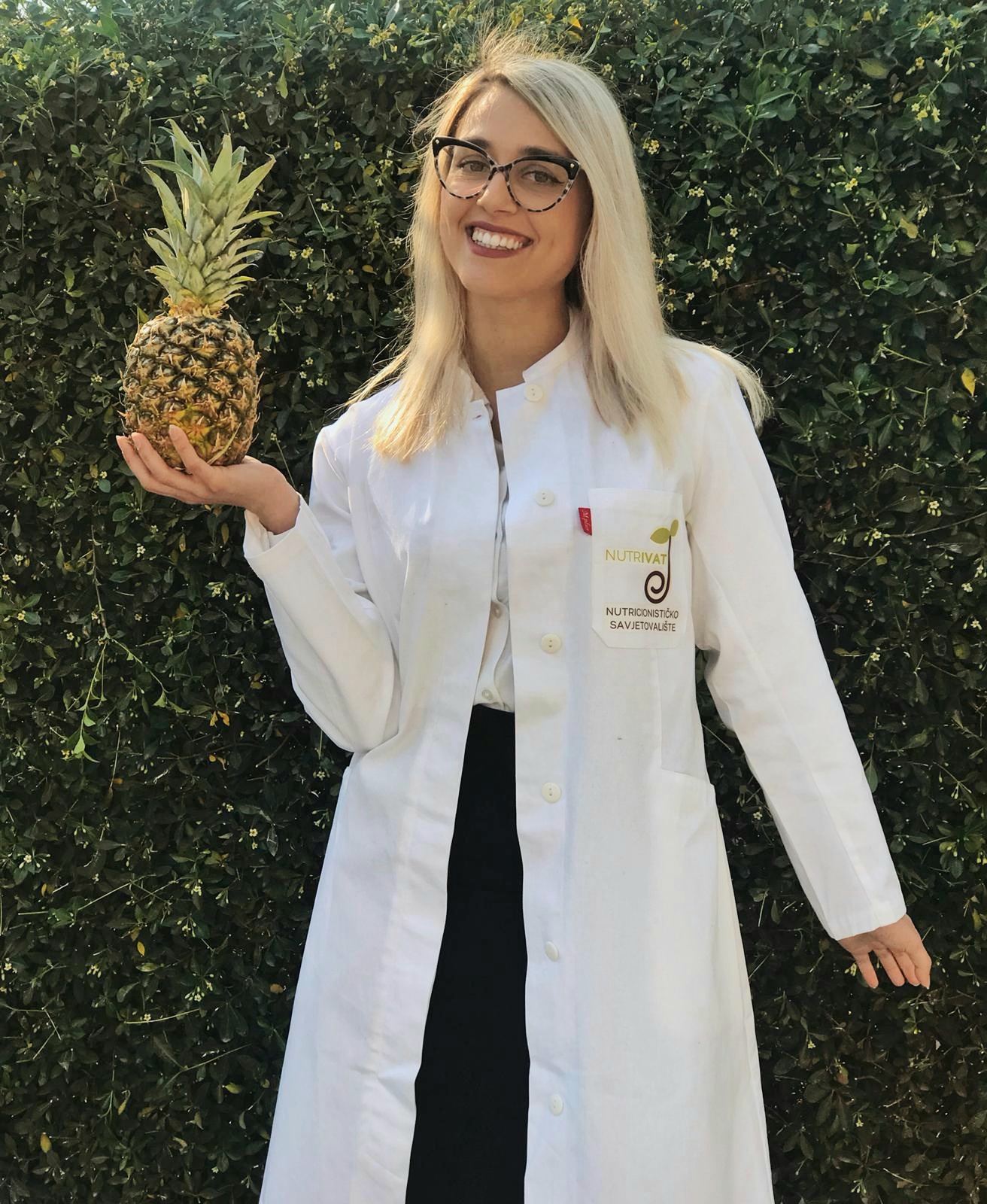 Iva Tokić, who has her own independent practice as a nutritionist and works as a nutritional educator and consultant for other polyclinics and sports professionals back in her hometown of Split. She has a Master's degree in nutrition
Iva Tokić, who has her own independent practice as a nutritionist and works as a nutritional educator and consultant for other polyclinics and sports professionals back in her hometown of Split. She has a Master's degree in nutrition
Food shopping in the UK is a very different experience to that in Croatia. You would struggle to understand fully just how different it is unless you'd actually done both. There simply isn't enough farmland in the UK to feed all of its inhabitants. Most food is imported. Where in Croatia, you can still experience the authentic experience of eating a varied diet based on the seasons, in the UK that simply doesn't exist. Everything is in season somewhere in the world. And that's where they'll take it from. Everything is available. All of the time.
What the UK loses in this set-up - seasonal eating and the varied diet this creates – it makes up for with the offer available and price. Food and flavours from all over the world can be bought in any of the competing supermarkets. International cuisine is incredibly popular. And, just as the supermarkets compete to lower prices, so do producers – it isn't only salmon and avocado that is cheaper in the UK.
The lamb produced in the lush, green hills of Wales or on the moors of northern England and southern Scotland is comparable in extremely high quality to the very best you could buy from Pag or anywhere else in Croatia. Except in the UK, the animals' diets are unrestricted – the lambs grow much bigger. Though much of this premium product is exported (British lamb is a highly prized delicacy across much of western Europe, particularly France), a lot of it is still sold in the UK. Its price is kept down by huge amounts of imported New Zealand lamb which competes against the domestic lamb in price. In Croatia, lamb is an expensive treat – in the UK, it's an everyday meat. And it is much cheaper than it is in Croatia. Although the lamb meat produced in the UK is of comparable quality to that produced in Croatia, the meats form a very different part of the diet in the two countries. In Croatia, lamb is an expensive treat. In the UK, lamb is much cheaper and viewed as an everyday meal
Although the lamb meat produced in the UK is of comparable quality to that produced in Croatia, the meats form a very different part of the diet in the two countries. In Croatia, lamb is an expensive treat. In the UK, lamb is much cheaper and viewed as an everyday meal
Within this one example we can sharply see the disparity between the premium food produced in Croatia and the general diet of the everyday citizen. Croatia is now known well for its cuisine and produce. TCN was pleased to report over recent weeks the success of food and agricultural exports from Croatia. However, the finest prsut, olive oil, seabass (brancin), bream (orada) and red wine for which Croatia is famous do not make up standard everyday Croatian meal. These luxuries are often exported. Pasteta (meat paste) on bread and cheap wine made palatable with cola are more likely to be the elements of Croatia's food found in any student kitchen in the country.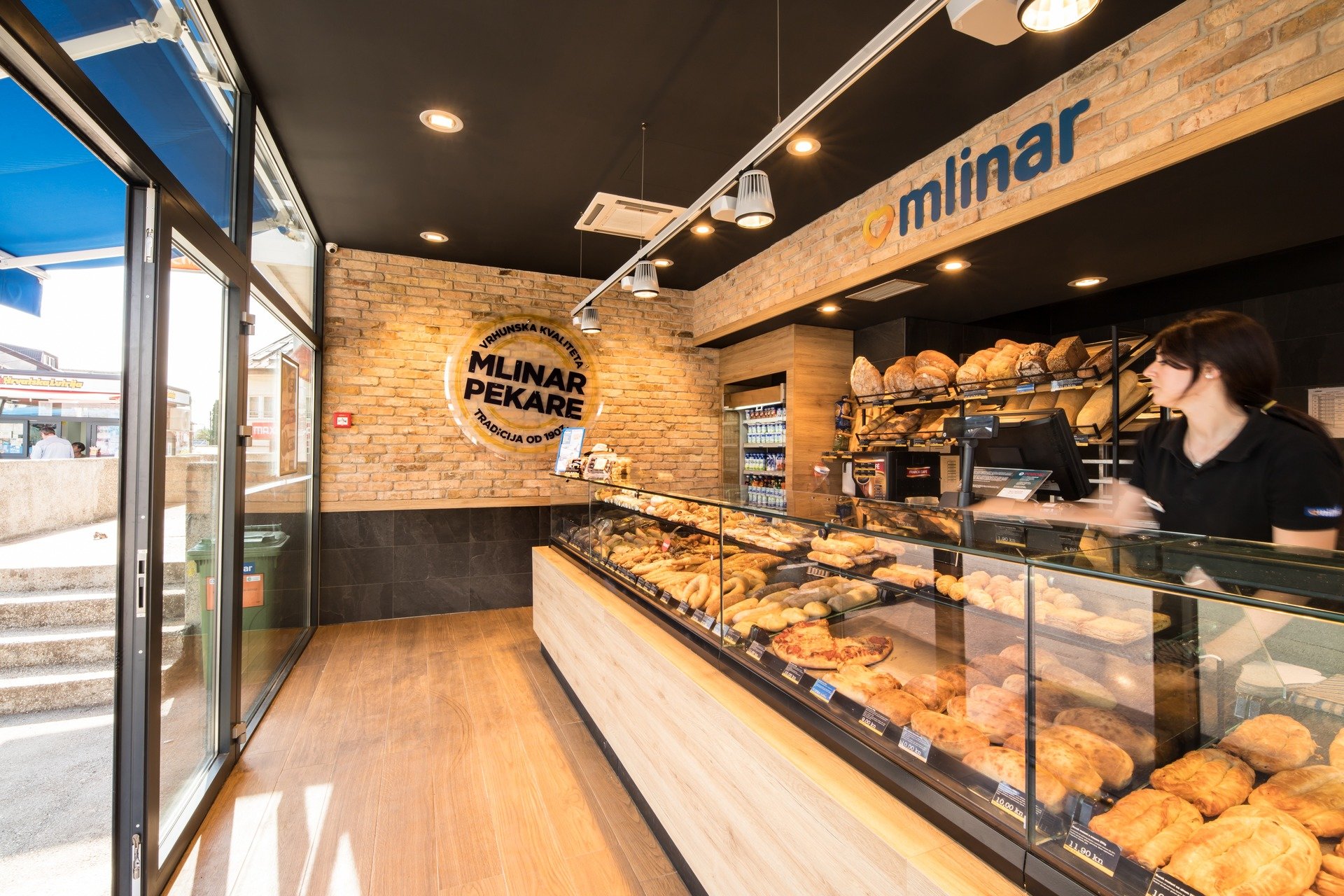 The pekara (bakery) is a fast, inexpensive and very popular choice for both breakfast and lunch in Croatia, but is it the healthiest thing to eat every day? © Mlinar
The pekara (bakery) is a fast, inexpensive and very popular choice for both breakfast and lunch in Croatia, but is it the healthiest thing to eat every day? © Mlinar
“We really don't eat enough fish. It's so disappointing because we live right next to the sea!” says Iva, who now works in her own independent practice, and as a nutritional educator and consultant back in her hometown of Split. “But, we don't eat enough of it because it's way too expensive for a lot of us to eat regularly. We also don't eat enough vegetables and fruit. We eat meat. We eat a lot of meat. We eat a lot of pekara (bakery) too. It's often the cheapest and the most convenient. If you want to save money and grab something fast, get breakfast in pekara. Students and older people in particular, they all eat in pekara. That's not good because that food is high in trans fatty acids and saturated fats. Saturated fats are a problem because it's a big cause of cardiovascular disease. Too much meat and pekara, not enough fish, fruit and vegetables – those are definitely the biggest problems with the Croatian diet.”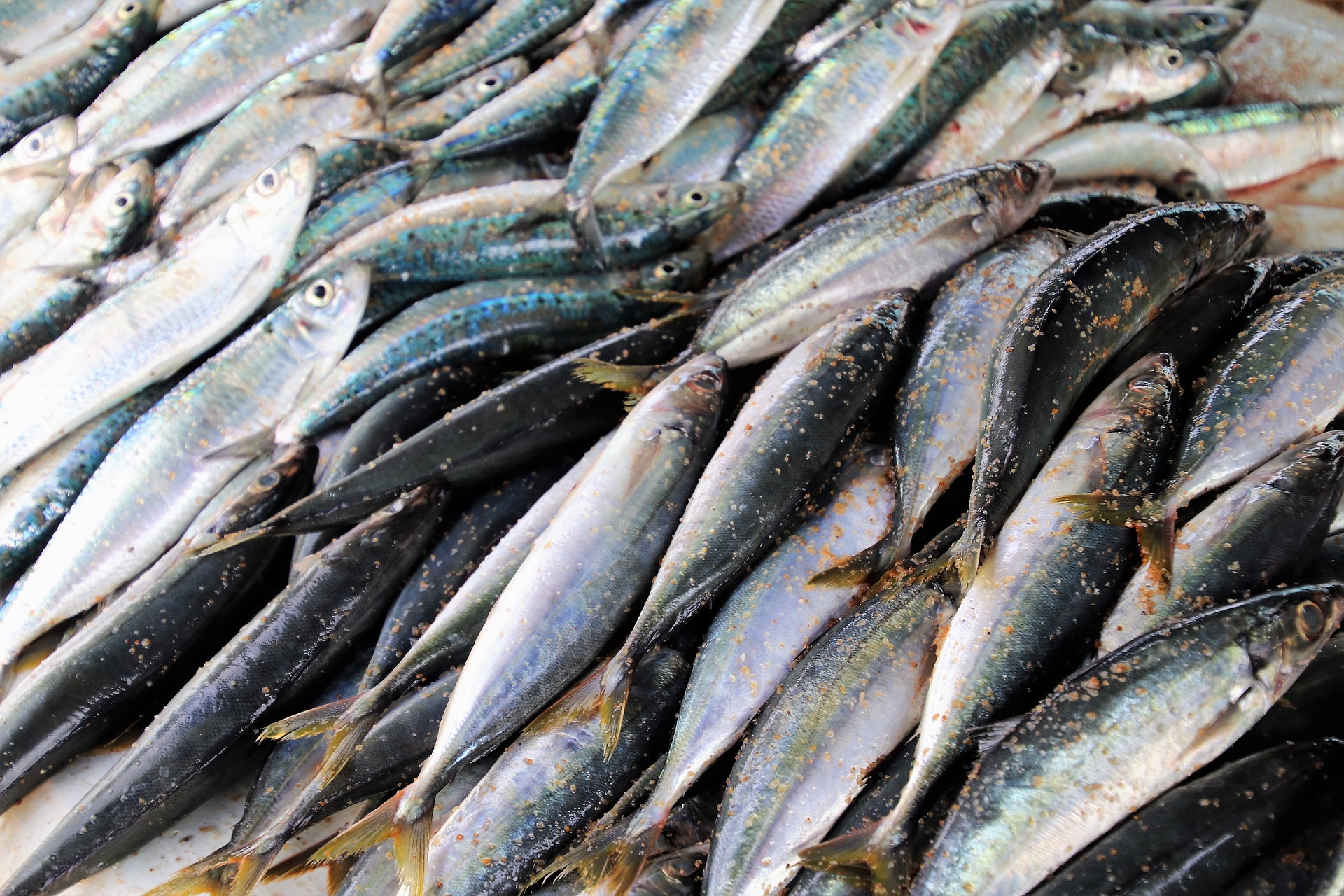 "Per capita consumption of fish and seafood in Croatia is estimated at 8 kg. Total consumption of fish and fish products per capita is significantly lower than in other Mediterranean countries. Fish is consumed mostly at home, traditionally once a week (on Friday) and during some holidays. The consumption of fish is higher in coastal areas than inland. Most fish is sold at traditional fish markets where the availability and freshness of fish products is considered very good. Only 3% of Croatia’s population eat fish every day, with the average person spending just 840 kuna (110 euros) a year on fish. In Croatia the most popular fish eaten are the cheaper varieties such as sardines and anchovies, followed by hake, mackerel and bonito. Croatia exports a big part of its quality fresh fish from the Adriatic, such as scampi and red mullet, whilst restaurants along the coast will often serve farmed fish or cheaper imported varieties." December 2016 Flanders investment and trade market survey of the Croatian Fishing sector, undertaken by the Trade Office of the Embassy of Belgium
"Per capita consumption of fish and seafood in Croatia is estimated at 8 kg. Total consumption of fish and fish products per capita is significantly lower than in other Mediterranean countries. Fish is consumed mostly at home, traditionally once a week (on Friday) and during some holidays. The consumption of fish is higher in coastal areas than inland. Most fish is sold at traditional fish markets where the availability and freshness of fish products is considered very good. Only 3% of Croatia’s population eat fish every day, with the average person spending just 840 kuna (110 euros) a year on fish. In Croatia the most popular fish eaten are the cheaper varieties such as sardines and anchovies, followed by hake, mackerel and bonito. Croatia exports a big part of its quality fresh fish from the Adriatic, such as scampi and red mullet, whilst restaurants along the coast will often serve farmed fish or cheaper imported varieties." December 2016 Flanders investment and trade market survey of the Croatian Fishing sector, undertaken by the Trade Office of the Embassy of Belgium
The problems of the diet created by Croatia's food habits have been observed for quite some time. And, according to the 2020 Global Nutrition Report, they are not getting better. Another report, one on childhood obesity published in just 2018 by the Croatian Institute of Public Health, stated that “every third child, i.e. 34.9% is overweight or obese. There are more overweight (21.5%) than obese (17.2%) boys. 67.3% of girls have a normal body mass index, 20.3% are overweight and 10.7% obese.” These figures are not improving, despite physical education being mandatory in Croatian schools.
“Everyone that comes to see me, everyone that seeks the help of a nutritionist, they all have high cholesterol levels, history of heart disease or they are obese,” says Iva. “The last one is becoming more of a problem. One third of children in Croatia are now obese. It's really quite pronounced. If you look at the statistics, obesity has actually been decreasing over recent years in developed countries. But, in Croatia, it is increasing.”
“Here, you can see the difference clearly between the UK and Croatia. In the UK, obesity was recognised as an issue and you can see the response throughout society. In the UK, you have taxes on sugary drinks. We don't have that here. The price of fruit and vegetables in the UK has actually been decreasing in recent years compared to average income. Here, it has only increased. At the supermarket checkout in the UK, it is now forbidden to have those tempting large racks advertising chocolates. From this year, that marketing is banned there, in the same way that advertising tobacco products is banned. Everything from the politics and the law to the school system is engaged in addressing the issue. We are not so much a developed country like the UK, so there is little promotion of physical activity here and no wider engagement of the issue. In the UK you even see signs suggesting “Why not takes the stairs instead of the elevator?” There's an effort to make everyone in society conscious of the issue.”
For a country famous for its international sports stars and the beach bodies that visitors see on the coast every summer, who would have thought that beneath the surface, Croatia's food and exercise habits were creating such a problem for the population? However, while a lack of exercise can be attributed to poor education and motivation, it is clear that economics has a significant impact on Croatia's food intake. In many cases, the poorer you are, the poorer you eat.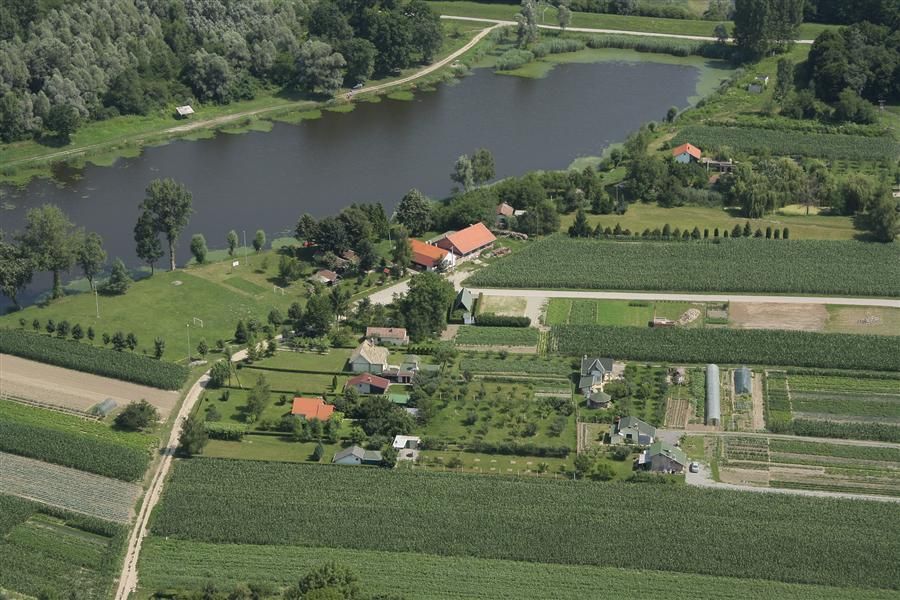 While eastern Croatia contains some of the country's economically weakest areas, many residents of Slavonia have land beside their houses where they grow vegetables, fruits and nuts. Despite this, they are still over-reliant on pork meat © Croatian National Tourist Board
While eastern Croatia contains some of the country's economically weakest areas, many residents of Slavonia have land beside their houses where they grow vegetables, fruits and nuts. Despite this, they are still over-reliant on pork meat © Croatian National Tourist Board
“In the more rural parts of our country, they eat much more seasonal fruits and vegetables,” says Iva. “They eat more vegetables in general – they grow it themselves and eat what they grow. Although, in many rural areas, there is still an over-reliance on meat. Especially the cheapest meat – pork.”
A 2008 study called Regional Differences in Dietary Habits of Adult Croatian Population conducted by researchers at the Andrija Stampar School of Public Health, School of Medicine, University of Zagreb concluded that the people in the poorest areas of Croatia had the poorest diets. Those regions were central Croatia and eastern Croatia (Slavonia).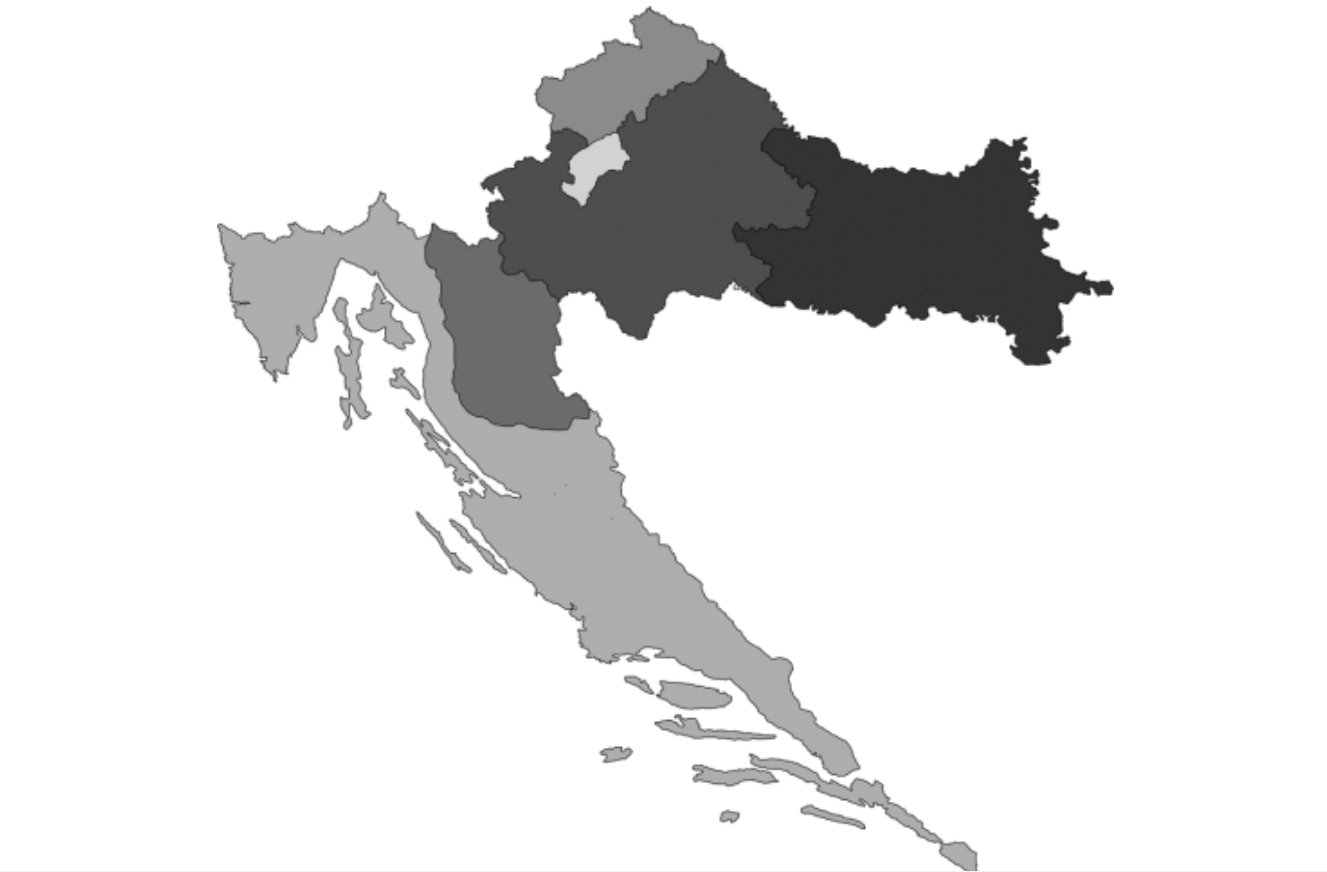 Croatia's food. A map showing the unhealthiest Croatian diets by region, produced for a study undertaken by researchers from the Andrija Stampar School of Public Health, School of Medicine, University of Zagreb. People who live in the poorest regions - central and eastern Croatia - have the least healthy diets. The diet of those who live in Zagreb, which has the country's highest wages, is very good
Croatia's food. A map showing the unhealthiest Croatian diets by region, produced for a study undertaken by researchers from the Andrija Stampar School of Public Health, School of Medicine, University of Zagreb. People who live in the poorest regions - central and eastern Croatia - have the least healthy diets. The diet of those who live in Zagreb, which has the country's highest wages, is very good
In these regions of higher unemployment and lower opportunities, people relied more heavily on a diet of red meat, preserved meats and smoked meats than anywhere else in the country. They also used more butter, pork lard and other kinds of animal fat in food preparation and more salt. While tradition and geographical location do play a part in forming these menus, it is incredibly naive to think that economics is not the key factor – there are river fish available all over Slavonia. This is not simply a question of a healthy Mediterranean diet in comparison to an unhealthy continental one – the City of Zagreb was shown in the study to consume an incredibly healthy diet of Croatia's food. The reason? It may be continental, but it has the highest wages in the country. The Croatian diet is heavily reliant on unhealthy pork meat. Unless you go to a specialist or high-quality outlet, you will find cheap pork meat in almost every mixed/minced meat dish - in cevapi, in lasagne, in bakery snacks, in beefburgers and cheeseburgers (yes, really, they put pork their burgers - sometimes you can even find cheap chicken meat mixed into Croatian burgers. True story) and even in the mixed kebab meat. They preserve pork as the highly prized prsut/prosciutto, in sausages like kobasica and kulen, eat the pig's blood in a sausage called krvavica and fry the pig rind to make a crunchy but hardly healthy snack called cvarci. Croatia also has the best bacon in the world.
The Croatian diet is heavily reliant on unhealthy pork meat. Unless you go to a specialist or high-quality outlet, you will find cheap pork meat in almost every mixed/minced meat dish - in cevapi, in lasagne, in bakery snacks, in beefburgers and cheeseburgers (yes, really, they put pork their burgers - sometimes you can even find cheap chicken meat mixed into Croatian burgers. True story) and even in the mixed kebab meat. They preserve pork as the highly prized prsut/prosciutto, in sausages like kobasica and kulen, eat the pig's blood in a sausage called krvavica and fry the pig rind to make a crunchy but hardly healthy snack called cvarci. Croatia also has the best bacon in the world.
“Sometimes the most difficult obstacle to good health facing those here who really need to change their diet is the cost of Croatia's food,” agrees Iva. “It's easy to say “you must eat more fish, fruit and vegetables”, but it's not always easy to do. Many people simply can't afford it. So, what I try to do in those cases is to look for the cheapest foods available which are still the right options. For example, sardines here are really not so expensive. They are high in Vitamin D and Omega 3, which is very important for cardiovascular health. I also recommend eggs, which are high in Omega 3 fatty acids and Vitamin D. I recommend changing to milk and cheese which have a lower fat content. You can find good food which is not that expensive. You might have to search, but you can find it. I recommend people to go and see what is in the discount section. There are lots of us looking to address these problems. On the Instagram page of different.hr each week they advertise what foods are on discount in every Croatian supermarket. That's a really useful resource. It's also great to grow something of your own. You don't need a huge Slavonian back garden to do it – you can even grow some things just on your balcony.”


